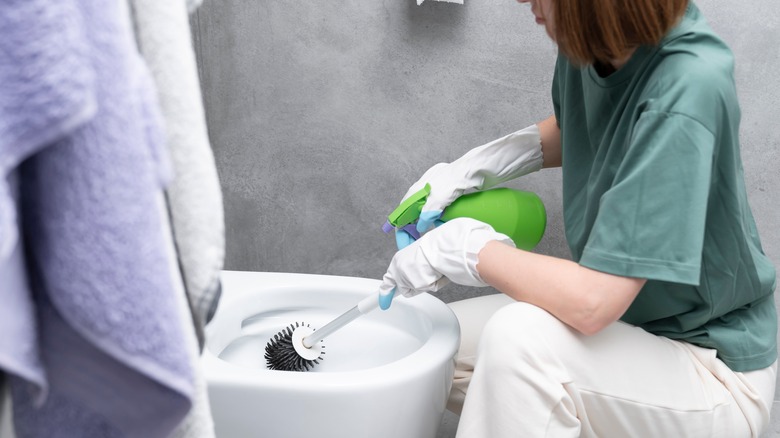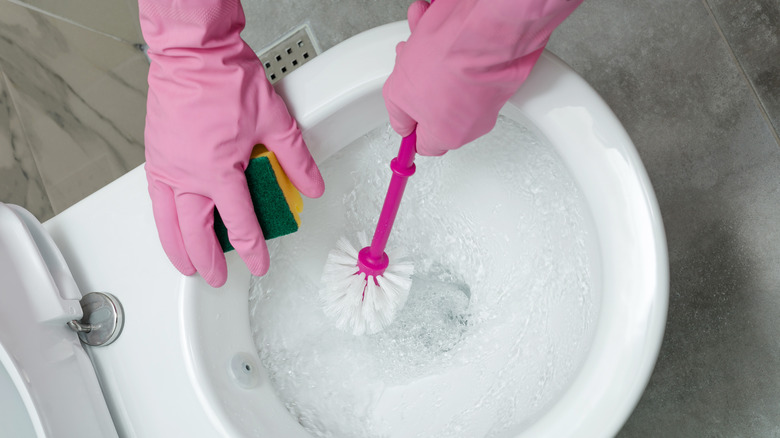TikTok Shows Us The One Thing Professional Housekeepers Do Before Cleaning Toilets
If there's one thing we're grateful to TikTok for, it's #CleanTok, a community where folks share their cleaning hacks, favorite cleaning products, and so on. One of the best parts is that professional home cleaners often share their advice for cleaning safely and efficiently, so it's basically like getting trained by a professional. When we looked at professionals advice for cleaning toilets, we were curious to see if there were any similarities between the various creators. One thing stuck out to us — that professional cleaners almost always wear gloves to clean toilets.
Video after video, cleaners slid on a pair of gloves before tackling toilet cleaning, which made us realize that they should really be a necessity anytime you're cleaning a toilet, at home or professionally. Gloves are essential to keeping your hands clean and germ-free, even if you're already using a toilet brush. Here's why you should always wear gloves when cleaning the toilet.
What do gloves protect us from when cleaning?
Nobody loves cleaning toilets (not even the professionals). The reason why is pretty obvious — the ickiest bodily functions happen in the toilet, and while cleaning it, it's very easy to come in contact with fecal matter, urine, tainted water, and other highly unpleasant organisms like bacteria and viruses.
Beyond the bodily contaminants, most professional cleaners are working with some pretty harsh chemicals in order to both clean and disinfect the toilet, like the ones that are found in your favorite toilet cleaners. Chlorine bleach and other chemicals can cause skin irritation and spread to other surfaces in the home. Gloves are great for as a biological and chemical safety measure.
Even while using a toilet brush, particles can be flicked out of the toilet bowl and onto your person. This might not be a huge deal if the water lands somewhere low-contact, like your knee. But your hands come in contact with literally everything, including the food you make and eat. Wearing gloves ensures that these particles won't end up on your hands and contaminate other surfaces later on. Gloves can do a lot to keep you safe, but you still need to follow a few guidelines to use them safely!
Best practices for wearing gloves
For one, be sure to buy latex-free nitrile gloves if you have a latex allergy. You should also have a dedicated pair of gloves just for cleaning the toilet. Don't make a bathroom cleaning mistake by using them in any other room — just like you wouldn't want to use the same scrub brush in your toilet as you would on your dishes, you don't want to use your toilet cleaning gloves anywhere else. Otherwise, you may have cross-contamination that can spread germs or trace amounts of urine and fecal matter throughout the home.
To prevent germ spread, be sure to clean and sanitize your gloves after each use. Wash the inside and outside of the gloves with a mild detergent, such as dish soap and warm water, then allow them to dry fully. If stored away while wet, they'll be susceptible to mold and mildew. Once dry, spray them down with the antibacterial disinfectant spray of your choice.
If this all sounds like too much work, you can always use disposable gloves! These gloves can be bought in bulk and thrown away after a single use. Though less eco-friendly than reusable rubber gloves, throwing them away after use effectively prevents cross-contamination. Finally, remember that even if you use gloves to clean the toilet, you still need to thoroughly wash your hands in warm water and soap afterwards for at least 20 seconds, according to the CDC.

